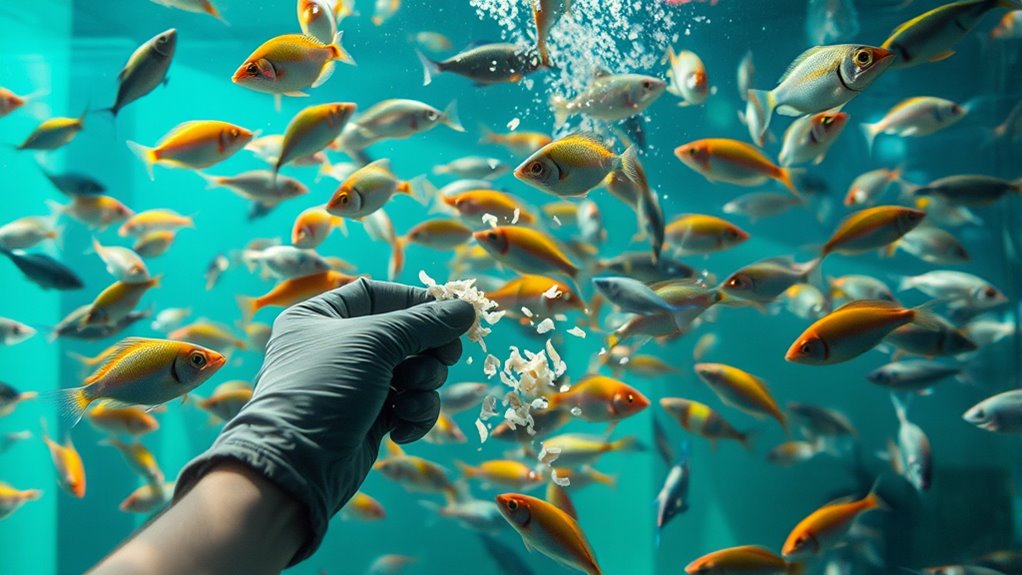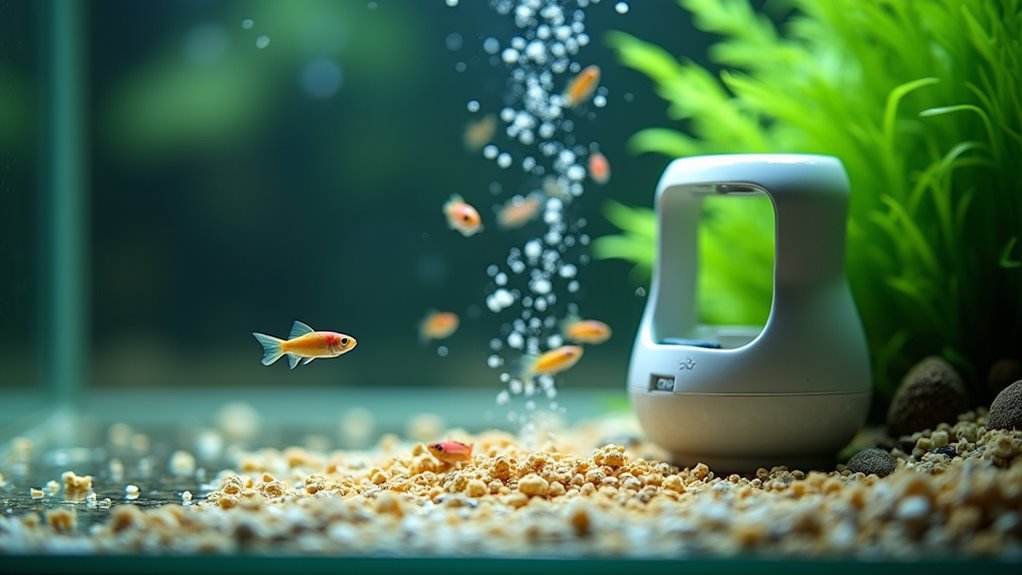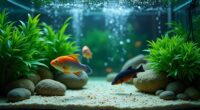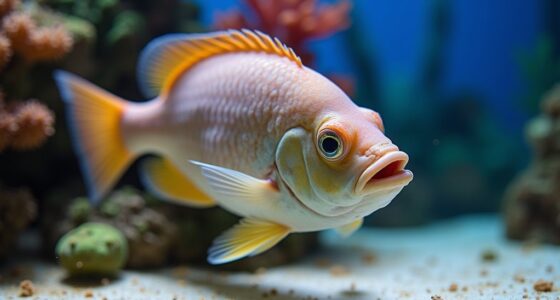To keep your fish healthy, feed them species-specific food like flakes, pellets, or frozen options once or twice daily at consistent times. Provide only as much as they can eat in 2-3 minutes to avoid waste and water pollution. Monitor their behavior and adjust portions if you notice signs of malnourishment or leftover food. For more tips on perfecting your feeding routine and keeping your tank pristine, continue exploring proven strategies.
Key Takeaways
- Feed high-quality, species-specific foods in varied forms like flakes, pellets, frozen, or live to meet nutritional needs.
- Offer food once or twice daily at consistent times to establish a routine.
- Provide only as much as fish can consume in 2-3 minutes to prevent water pollution.
- Observe fish during feeding to adjust portions and ensure they are eating adequately.
- Remove uneaten food promptly and monitor water quality to maintain a healthy environment.

Feeding your fish properly is crucial for their health and longevity. When you focus on the right feeding habits, you help maintain the overall health of your aquarium and support your fish’s immune system. Proper feeding also reduces waste and helps keep your aquarium clean, which in turn makes your aquarium maintenance easier and more effective. Knowing what to feed, when to feed, and how much to give can seem overwhelming at first, but once you establish a routine, it becomes second nature.
Proper feeding ensures your fish stay healthy, vibrant, and easy to care for.
Start by understanding the dietary needs of your specific fish species. Some fish are herbivores, others are carnivores, and some are omnivores. Using high-quality fish food formulated for your species ensures they get the essential nutrients needed for growth and vitality. Stick to a varied diet—flakes, pellets, frozen, or live foods—to prevent nutritional deficiencies and keep your fish engaged. Remember, feeding the right food not only benefits your fish’s health but also reduces excess waste, which can deteriorate water quality, making aquarium maintenance less of a chore. Additionally, providing your fish with appropriate portion sizes supports their digestion and overall health.
When it comes to timing, consistency is key. Feed your fish once or twice a day, ideally at the same time, so they can develop a routine. Avoid overfeeding, as it can lead to water quality issues and health problems like obesity or swim bladder disorders. Observe your fish during feeding to gauge how much they consume in a few minutes. If there’s uneaten food settling at the bottom, reduce the amount you give next time. Keeping portions appropriate ensures your fish get enough nourishment without polluting the water. It’s better to give smaller portions more frequently than large meals that go uneaten.
The amount you feed is just as important as what and when. A good rule of thumb is to offer only what your fish can consume in about two to three minutes. Overfeeding can cause excess organic waste, which impacts water quality and complicates aquarium maintenance. Regularly check your fish’s behavior and body condition; if they appear sluggish or have visible signs of malnutrition, adjust your feeding routine accordingly. Additionally, monitoring water parameters can help detect early signs of overfeeding or poor water quality, ensuring your fish stay healthy. Also, remove any leftover food after feeding to prevent it from decomposing and affecting fish health. Incorporating mindfulness techniques into your feeding routine, such as observing your fish carefully, can help ensure you are providing the right amount and type of food for their needs.
Frequently Asked Questions
Can I Feed My Fish Human Food?
You might wonder if you can feed your fish human food, but it’s best to avoid it. Human food lacks the necessary nutrients found in fish meal and can harm your fish’s health. Instead, follow a proper feeding schedule with high-quality fish food. Using fish meal-based pellets ensures your fish get balanced nutrition. Stick to appropriate portions and avoid giving them leftovers or processed human foods for a healthy, happy fish.
How Do I Know if My Fish Is Overfed?
You might think your fish is starving, but overfeeding can actually lead to fish obesity. To spot overfeeding, watch for uneaten food settling at the bottom or murky water—these are signs you’re feeding too often or too much. Stick to a proper feeding frequency, and remember, more isn’t better. Your fish’s health depends on balanced portions, not endless snacks. Overfeeding risks harm, so keep it moderate and observe carefully.
Should I Feed My Fish at the Same Time Every Day?
You should feed your fish at the same time every day to establish a consistent feeding schedule. This helps reduce stress and prevent overfeeding, ensuring your fish stay healthy. A consistent feeding routine makes it easier to monitor their eating habits and spot any issues early. Stick to regular times, and keep portions small to avoid overfeeding, which can lead to water quality problems and health issues for your fish.
What Are the Signs of Malnutrition in Fish?
You want to recognize signs of malnutrition in your fish. Watch for physical symptoms like dull or faded colors, clamped fins, or weight loss. Nutritional deficiencies can cause issues like weakened immune systems or abnormal swimming. If you notice these signs, it’s a clear indication that your fish aren’t getting proper nutrition. Addressing these symptoms promptly helps make certain your fish stay healthy and vibrant.
How Often Should I Vary Their Diet?
You should vary your fish’s diet regularly to guarantee they get all necessary nutrients. Incorporate different types of food, like flakes, pellets, and live or frozen options. Maintain a consistent feeding schedule, but adjust the diet variation every few weeks to prevent boredom and malnutrition. This approach keeps your fish healthy and happy, supporting their immune system and overall well-being.
Conclusion
So, now that you know what, when, and how much to feed your fish, remember: it’s not rocket science, just fish! Resist the urge to overfeed—your aquatic friends will thank you (and so will your filter). After all, a well-fed fish is a happy fish, and a happy fish makes for a much more interesting conversation starter when guests visit. Happy feeding, and may your fish never develop an attitude!










